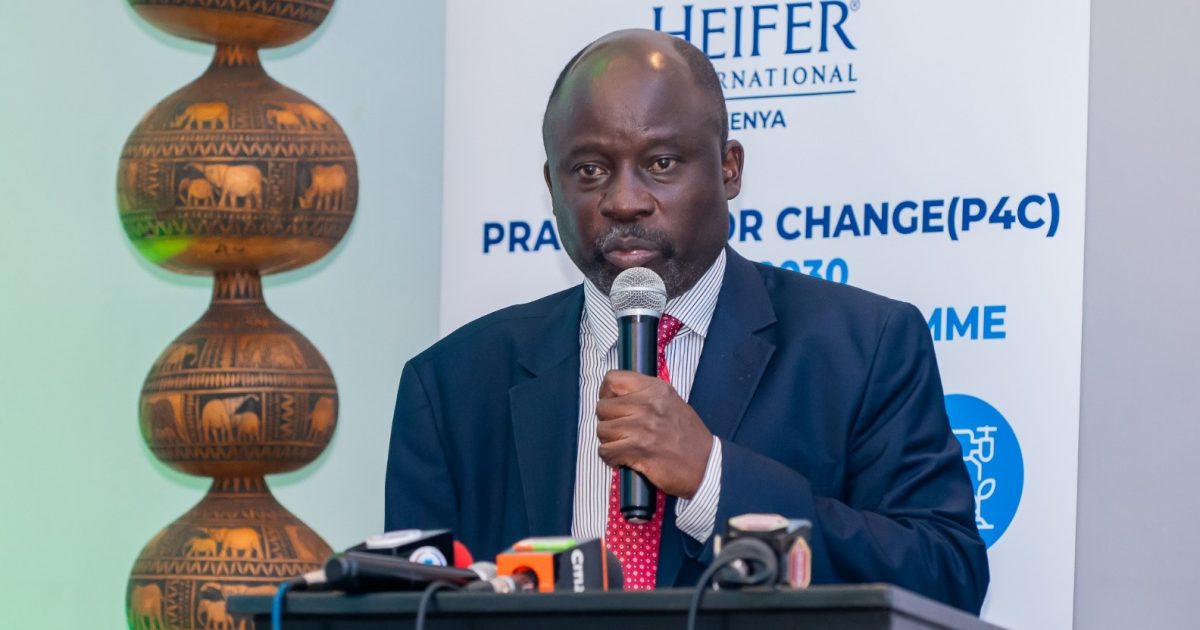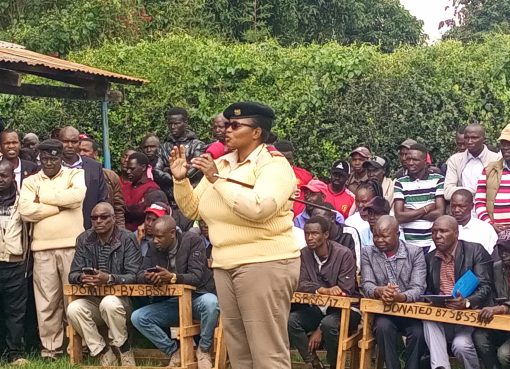The government is developing a climate-smart Livestock Master Plan (LMP) that will ensure provision accurate data and information on livestock resources.
The plan will also provide the available environmentally friendly investment options to guide the development of a sustainable livestock sector to attract more and better targeted investments.
In a speech read on his behalf by the Director of Livestock Policy Research at the Ministry of Agriculture Dr. Christopher Wanga during the launch of Heifer International Kenya’s ambitious and transformative Practice for Change (P4C) Signature Program, Agriculture Cabinet Secretary Mutahi Kagwe said that over 80 percent of Kenya is arid or semi-arid (ASAL), where the livestock sector is an integral part of the agricultural sector while playing a key role in supporting livelihoods, generating income, contributing to healthy diets, and climate resilience in these and other rain-fed areas.
“Agricultural transformation is not a sprint; it is a decades-long journey that requires us to modernize on-farm production, integrate value addition, and create systems that are both productive and resilient, and this transformation is not optional but essential,” Kagwe said.
The CS lauded Heifer International’s Kenya Practice for Change (P4C) Signature Program, which is estimated to inject Sh12.4 billion (USD 95.7 million) into the country’s economy, saying it is coming at a critical time for Kenya’s agricultural transformation journey.
Kagwe also called on Heifer International to align its work in the country with Kenya’s vision for sustainable agriculture transformation and galvanize increased support for Heifer Kenya.
If implemented well, the Practice for Change (P4C) Program framework, Kagwe said, will support the transformation of Kenya’s agricultural sector and uplift the lives of smallholder farmers and termed the event as more than just a program launch but also a call to action.
Surita Sandosham, president and CEO of Heifer International, said the long-term program collaborative initiative is designed to support 625,000 farming households across 26 counties in achieving a sustainable living income by 2030.
The program, she added, is a commitment to inclusive rural development built on the strength and potential of Kenya’s farmers, especially women and young people, and at its core, P4C is about creating opportunities that are locally driven, market-oriented and sustainable.
“P4C takes a systems approach to market development. It targets key agricultural value chains—poultry, dairy, red meat, and horticulture, and invests in building the capacity of farmer organizations, improving productivity, increasing profitability, and opening access to sustainable market,” Sandosham said.
The President said that the investment is expected to be mobilized through a combination of Heifer’s resources, catalytic capital, and co-managed funds with donors and public institutions.
“We will be working alongside national and county governments, farmer cooperatives, development partners, and private enterprises to achieve shared outcomes,” Sandosham.
Clarice Bugo-Kionge, Heifer International, Country Director – Kenya, said Heifer International has been a steadfast partner in Kenya’s agriculture with a focus on dairy development.
“We have pioneered the cow to capital approach, a model that has evolved from simply providing livestock to creating comprehensive value chains that empower smallholder farmers to become successful Agri-entrepreneurs, and this approach has seen families transition from subsistence farming to sustainable businesses that generate living incomes.
Bugo gave an example of Nakuru County, where they have created sustainable support systems, and through it, livestock mortality rates have reduced significantly and yields have doubled for thousands of farming households, especially women and youth who have been empowered to play more active roles in the dairy sector.
“Across various programs in four value chains, namely beef/cattle, dairy, horticulture and poultry, we have recorded over three million active household participants to date,” she added.
Bugo noted that the ambitious P4C will not only provide access to clean energy through the Power, Water and Internet (PWI) initiative but will also scale the Agriculture, Youth, and Technology (AYuTe) initiative, equipping young innovators with the funding, mentorship, and digital tools they need to revolutionize value chains, thus attracting youth to agriculture and also employment creation.
This program will also promote financial inclusion through Heifer Impact Capital, which will help bridge financing gaps for farmer-owned enterprises.
The Ministry is committed to implement Bottom Up Economic Transformation Agenda (BETA) and Food security, which requires a vibrant climate resilient, commercial and modern Agricultural Sector that sustainably supports Kenya’s economic development, national priorities, and commitments to the Malabo Declaration on Accelerated Agricultural Growth and Transformation for Shared Prosperity and Improved Livelihoods has been key.
By Wangari Ndirangu





